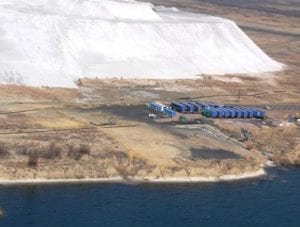Water has long been described as a commodity in the same way as coal, metals and oil are. This description becomes more and more relevant as the true value of water starts to become clear, according to water solutions provider NuWater.
A recent Bank of America Merrill Lynch research report describes water as ‘the new oil’. Is this just sensationalist? NuWater thinks not and is applying new thinking and strategies to water reclamation and reuse that are more common in extractive industries than in water utilities. And how better to understand water as a valuable commodity than to work with mining, oil and gas, and energy companies to improve their water security, reduce their water costs and ensure environmental sustainability? Setting their sights on sustainability NuWater was established in 2010 following the acquisition of the international GrahamTek 16” reverse osmosis (RO) technology rights. NuWater quickly consolidated the operations of GrahamTek Singapore and GrahamTek South Africa, creating an international technology-led water treatment and desalination solutions and services company. NuWater immediately focused its sights on unconventional desalination applications in the mining, oil and gas, and power sectors – all large users of water. At the same time, the company has used its credentials in wastewater reclamation for potable reuse to drive its business into the more conventional water and wastewater sectors.NuWater has developed an impressive portfolio of reference projects covering multiple industries and geographies from its operations in Cape Town, Singapore and London. Modular &mobile NuWater started working with Anglo American Thermal Coal in late 2010 to deliver a completely ‘modular & mobile’ mine drainage wastewater reclamation plant at the New Vaal Colliery near Vereeniging. “The New Vaal project involves the treatment and desalination of mine drainage water from a storage dam on the mine and the transmission of the resulting high-quality potable water to Eskom’s neighbouring Lethabo power station for reuse as cooling process water. This has environmental sustainability benefits for both Anglo American Thermal Coal and Eskom, as well as economic benefits,” says John Holmes, NuWater’s CEO, describing the project. “Anglo recognised the benefits of our proposal for a completely ‘modular & mobile (redeployable)’ wastewater treatment and desalination plant based on our proprietary RO technology. This allowed us to offer them an economically attractive and flexible solution whereby NuWater charges only for the water treated while retaining ownership and operational responsibility for the plant. NuWater would simply not have been able to offer this flexible BOO (build, own and operate) model were this a conventional fixed plant rather than our rapidly redeployable design.” The first high-quality water was produced in December 2010 with production capacity ramping up to its current maximum of 20 000 m3/day. At this current capacity it is believed to be the largest plant of its type in the world and is confirmation of NuWater’s technological and project delivery capability. Johan Fourie, operations manager at the New Vaal Colliery confirms: “NuWater has repaid our confidence in its technology, skills and customer commitment by delivering a world-class solution.” Rapid deployment NuWater is also currently working with Murray & Roberts on a project for Gold Fields to deliver two mine wastewater treatment and desalination plants for their mine in Tarkwa, Ghana. Once again, NuWater was selected for this project based on its proven technology and modular solution, which allows for rapid deployment and future redeployment. The project involves two plants each producing about 7 500 m3/d of high-quality potable water from mine wastewater for reuse or return into the environment. The first phase of this project will be commissioned by the end of 2012, less than four months from the project award, with the balance of the project completed by May 2013.In discussing some of the challenges of the project and how NuWater has been able to address these, Holmes says: “The Gold Fields Tarkwa project is a logistical challenge due to its location and short delivery timeframes. We have, however, been able to leverage our operations in Singapore and the UK to ensure the necessary plant equipment is available on time.” Facing forwardNuWater expects to convert more mining-related projects over the next 12 months. In addition, the company is extending its solutions to offer higher recovery to minimise the amount of concentrated brine produced from the RO process or to eliminate brine altogether to achieve zero brine, or zero liquid discharge (ZLD). According to Jeeten Nathoo, chief technology officer at NuWater:“Brine management is a major obstacle to wider and more rapid adoption of RO for large-scale industrial wastewater reclamation projects. Concentrated brine must either be recycled or stored in evaporation ponds, which is costly and, in cases of limited space, impractical. NuWater has been developing brine concentration processes along with both proprietary and externally sourced ZLD technologies in order to offer our customers brine management solutions as a standard part of our ‘modular and redeployable’ plants. We will be field testing these on actual brine streams from our existing plants during the course of 2013.”
Similar to mining, the oil and gas sector is both a major user of fresh water and producer of wastewater. Holmes explains that NuWater has a number of projects in the pipeline in the sector. These projects focus on the production of low salinity water for oil well injection to enhance oil recovery. This generally involves seawater desalination, but is applicable to both on- and offshore oil fields. Water produced from wells when oil is extracted (produced water) also presents a significant opportunity for NuWater as does unconventional gas, for example hydraulic fracturing – fracking – and coal bed methane. Once again, customers in this sector expect a complete solutions and services offering similar to that offered by NuWater in the mining sector. The third sector NuWater has targeted for growth is power. Power and water are closely related for a number of reasons. Apart from the fact they are both considered essential utilities in the modern world, power generally requires significant amounts of water for cooling while water treatment, in particular desalination, requires significant amounts of power. Power and water are also critical inputs into many industrial processes. According to Holmes: “What is particularly interesting for NuWater is the growth in the market for distributed mid-sized power solutions. Our ‘modular & mobile’ water treatment and desalination solutions fit very well alongside this growing power market. We are therefore in the process of developing some interesting strategic relationships with providers of distributed power solutions. Of course we still see good opportunities in the conventional power generation market, particularly for wastewater reclamation and reuse at coal-fired power stations.” Active participation NuWater is a big believer that the recovery and potable reuse of secondary wastewater from conventional wastewater treatment plants presents a major opportunity to alleviate pressure on our water resources. This is, however, a complex topic and goes well beyond technical feasibility. It will require extensive public consultation to explain the rationale and discuss concerns about the suitability of wastewater reclaimed through RO for human consumption. Holmes elaborates: “NuWater intends being an active participant in the discussion around wastewater reclamation and potable reuse both in South Africa and in other water-stressed countries in sub-Saharan Africa. In Singapore we have been actively involved in the country’s secondary wastewater reclamation and reuse strategy and our large-diameter (16”) RO technology is in use at the Singapore Public Utilities Board 55 000 m3/d flagship plant at the BedokNEWater Factory, also the site of the national water visitor’s centre.” “From a technology point of view, one does not get a much better reference plant than Bedok and this serves NuWater very well when demonstrating the benefits of water reclamation and potable reuse. It has, however, taken a huge investment in public education in Singapore to get people comfortable with the concept of drinking reclaimed sewerage water, even when this is indirectly through recycling of this water back through catchment reservoirs. “In actual fact much of the reclaimed water from the Bedok plant is diverted to industrial reuse. This has the benefit of relieving some of the demands on the natural water supply, which can then be more freely allocated to domestic consumption.” Whether the value of water ever reaches the lofty heights of oil remains to be seen. What is clear is that water is a finite and increasingly valuable commodity and companies such as NuWater, with the technology and creativity to extract value from wastewater that is otherwise considered useless or even harmful, have a valuable role to play in ensuring our long-term water security.






